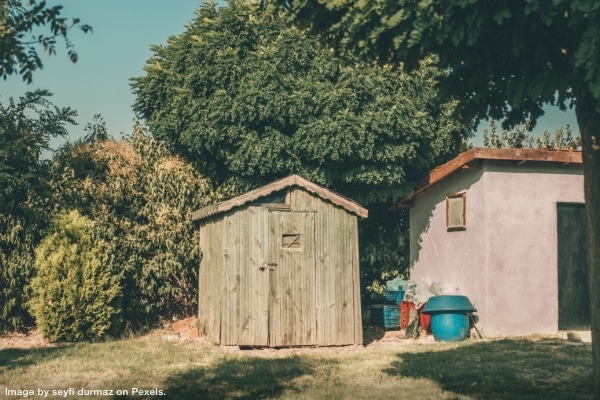
Sometimes, our outdoor spaces can become a catch-all for everything we don’t want inside our homes, especially over the cooler months. But tossing all our junk in the yard won’t make us the darlings of the neighbourhood. In fact, a recent survey indicates one of the top factors respondents cited for being a good neighbour was that they maintained their property (47%). So, let’s talk about decluttering your outdoor space.
Yard
The largest outdoor space to declutter is most likely your yard. Dispose of rusty gardening equipment, broken toys, used tires, scrap lumber, fencing, and other construction material. Recycle or donate what you can and put the rest in the trash. If you have a lot of outdoor clutter or need help managing the job, consider hiring a property maintenance company. They can also trim your trees and shrubs and cut the grass too.
Play Structures
Inspect play structures such as jungle gyms and swing sets for safety concerns. If your children no longer use the structures, consider letting them go. If they are in good condition, selling them using local classified ads or giving them away on online donation sites is often relatively easy. Generally, you must dismantle broken or unsafe outdoor play equipment to send it to a disposal facility.
Patio / Balcony
As with your yard, the first step is to declutter. Place broken items into the trash or appropriate recycling stream. Place unused items in another area and arrange to sell or donate them. Remember to dispose of old or excess barbeque tanks according to local guidelines.
Next, examine your remaining items and separate them into seasons. Clean your off-season items and place them in storage. If you don’t have a separate storage area, consider investing in a deck bench – storage that doubles as seating. You can store tall items like rakes, shovels, and the like in a vertical storage shed. The vertical shed is ideal for balconies or small patios because it doesn’t take up much floor space, and you can add shelves to hold smaller items like plant pots and soil.
No one likes to see (or smell) household garbage, so invest in good-quality waste containers. Choose bins with tight-fitting lids to deter birds and other pests. Alternatively, choose a smaller outdoor storage shed to corral the open-type recycling bins.
Garden Shed
Garden sheds are like a mini houses in your outdoor space. And the best time to organize sheds is when the season changes. Ideally, choose a sunny day to remove all the items from the shed and place them in your yard. Once your shed is empty, sweep it, remove cobwebs, clean the windows, and lubricate the door hinges. Inspect the shed for other needed repairs. Then, schedule time to complete the work yourself or set a reminder to book a service professional.
Next, group the contents into categories. Some basic ones might include:
- Tools and home maintenance
- Lawn and garden
- Pool equipment and maintenance
- Snow clearing
- Sports equipment
Focus your decluttering process on one category at a time. Be realistic about what you use and what you need. For example, if you are downsizing from a large house to an apartment-style home, you can probably let go of your outdoor maintenance equipment. Likewise, with your tools, keep only those you use regularly. Consider becoming a member of the Vancouver Tool Library and renting items you need for one-time or occasional use.
Once your decluttering is complete, you can set up storage zones in the shed. Invest in some shelving to keep items organized. Ideally, choose a material that can withstand humidity and temperature changes. Plastic shelving units are a good option, but powder-coated or galvanized steel shelves are more robust. If your shed construction allows, consider installing a slat-wall system. It is durable and easy to configure (and re-configure) as your storage needs change.
Sheds are small, so it is wise to maximize the vertical space. Install hooks and racks from the ceiling to store long things such as pieces of lumber, skis, snowboards and surfboards.
Be very careful when handling and disposing of household hazardous materials such as fertilizer, pool chlorine, solvents (gas, paint thinner), etc. Ensure you read the safe handling and storage instructions when designating a place for these items in your garden shed. Also note that rusty or damaged aerosol canisters (spray paint, lubricants etc.) can develop weak spots and explode. Dispose of them properly.
Finally, clean your tools and sports equipment at the end of the season. Schedule maintenance now when repair shops are less busy, and you’ll be ahead of schedule when the seasons change again.
For more advice on decluttering and organizing your outdoor space, check out our articles on garages and cars. And if you’re moving, read through our helpful tips on preparing outdoor items for a move.
Image by seyfi durmaz on Pexels.
